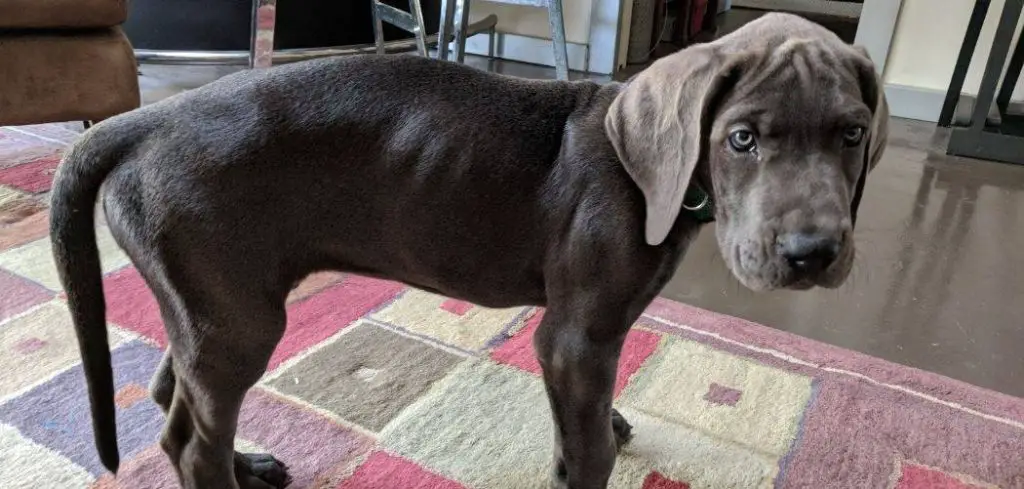If your puppy has loose stool with blood, it can be a very worrying sight for any dog owner. While puppies often have sensitive stomachs and may experience mild digestive upset, seeing blood in their stool should never be ignored.
It could be a sign of something simple, but it may also indicate a more serious health issue that requires urgent care.
We outline the common causes of a puppy having loose stool with blood, what you can do at home, and when to seek veterinary help.
Table of Contents
Puppy Loose Stool with Blood — Why It Happens
Puppy loose stool with blood can happen for several different reasons, ranging from minor irritation of the intestines to dangerous infections. Puppies are especially vulnerable because their immune systems are still developing, making them more susceptible to viruses, parasites, and dietary mistakes.
Stress, sudden food changes, and eating unsafe items can also upset their digestive tract. In some cases, blood may appear due to inflammation, intestinal injury, or disease that requires immediate veterinary care.

Puppy Loose Stool with Blood: Common Causes
Parvovirus
Parvovirus is one of the most serious causes of bloody diarrhea in puppies. This highly contagious virus attacks the intestines, leading to severe vomiting, foul-smelling bloody stool, lethargy, and rapid dehydration.
Puppies that are unvaccinated or incompletely vaccinated are at highest risk.
Parvo progresses quickly and can be fatal if not treated promptly. If your puppy has bloody stool, especially along with vomiting or lethargy, it is an emergency and requires immediate veterinary attention.
Read more: Dog Loose Stool with Blood and Mucus but Acting Normal (Here’s Why)
Intestinal Parasites
Worms such as hookworms and whipworms, as well as protozoa like coccidia and giardia, are common in puppies.
These parasites irritate and damage the intestinal lining, which can cause loose stool with blood or mucus.
Other symptoms may include weight loss, a bloated belly, or decreased appetite. Since puppies often pick up parasites from their environment or even from their mother, routine deworming is essential.
Dietary Indiscretion
Puppies love to chew and often swallow things they shouldn’t. Eating garbage, spoiled food, or foreign objects can irritate the digestive tract and cause loose stool with streaks of blood.
Even something as simple as a sudden change in diet can upset a puppy’s system. While this cause is usually less severe, it’s still important to monitor closely and prevent access to unsafe items.
Stress and Anxiety
Stress can have a surprisingly strong effect on a puppy’s digestion. Situations like moving to a new home, being boarded, or experiencing separation anxiety can lead to loose stool, sometimes tinged with blood due to intestinal inflammation.
Stress-related colitis is not uncommon in puppies, and while it may resolve once the stressor is removed, any presence of blood should still be evaluated.
Bacterial Infections
Harmful bacteria such as Salmonella or Clostridium can infect a puppy’s gut, leading to diarrhea, sometimes with blood or mucus. Puppies may pick up bacteria from contaminated water, food, or surfaces.
Unlike mild stomach upset, bacterial infections often make puppies more lethargic and may cause fever or loss of appetite. Treatment usually requires antibiotics prescribed by a veterinarian.
Inflammatory or Structural Problems
Though less common in very young puppies, conditions like inflammatory bowel disease (IBD) or congenital intestinal defects can cause recurrent loose stool with blood. These are usually diagnosed after ruling out infections and parasites.
They may present with ongoing digestive trouble, poor growth, and weight loss, which can interfere with a puppy’s healthy development.
What to Do If Your Puppy Has Loose Stool with Blood
If your puppy has loose stool with blood but seems otherwise alert, you can take some steps at home while arranging for a veterinary checkup.
Start by withholding food for a short period (about 8–12 hours) to give the digestive system time to rest, but never withhold water. Dehydration can happen quickly in puppies, so offer small, frequent sips of fresh water.
Once you reintroduce food, choose a bland diet such as boiled chicken and rice, or a vet-recommended gastrointestinal diet. Feed small amounts several times a day instead of one or two large meals.
Keep your puppy calm and stress-free. Limit rough play and avoid sudden changes in environment or diet while their stomach is sensitive.
Most importantly, observe your puppy closely. If symptoms improve within a day and no additional blood is seen, it may have been a minor upset. However, puppies are fragile, and bloody stool should always be taken seriously.
When to Call or Visit Your Vet
While mild loose stool can sometimes resolve on its own, blood in your puppy’s stool is a red flag that should prompt a vet visit.
Seek immediate veterinary care if your puppy is also vomiting, refusing food, extremely lethargic, or showing signs of dehydration such as dry gums or sunken eyes. These symptoms suggest a more serious underlying problem like parvovirus or a bacterial infection.
Even if your puppy seems otherwise normal, blood in the stool is not typical. A vet can check for parasites, infections, or other conditions and start appropriate treatment before the problem becomes dangerous.
Because puppies can decline quickly, it’s always better to be cautious and have them examined.
Read more: Dog Suddenly Has Loose Stool (Causes and what you can do fast)
Key Takeaway
Seeing blood in your puppy’s loose stool is always concerning and should never be brushed off. While it may result from something as simple as stress or a sudden diet change, it can also signal dangerous conditions like parvovirus, parasites, or bacterial infections.
The best approach is to keep your puppy hydrated, feed a gentle diet, and seek veterinary advice promptly. Early treatment not only helps your puppy recover faster but can also prevent life-threatening complications.
With proper care and close attention, most puppies with digestive upset can bounce back quickly and continue growing into healthy, happy companions.
